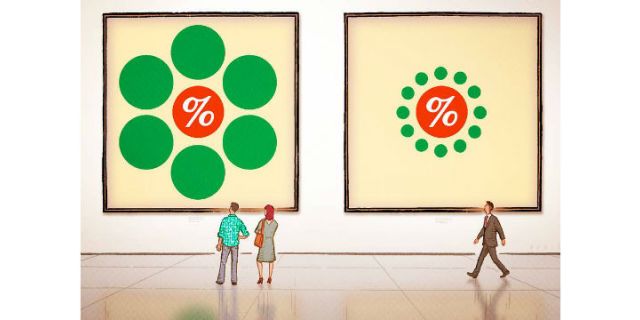
Big gains can be hard to find in the financial markets. Nowadays, though, they seem to be everywhere — and that could change how you feel about taking risks.
As of Nov. 16, the S&P 500 is up 359% since the bull market began March 9, 2009, counting dividends, according to S&P Dow Jones Indices. This year alone through Nov. 16, Alphabet (the parent company of Google) has returned 32%, Amazon.com 52%, Apple 50% and Facebook 56%, including dividends. Bitcoin, the digital currency, has gained more than 700% so far this year.
Against that backdrop, even what investors used to regard as a generous annual gain — say, 10% — starts to feel paltry. New research into a mental process called “contrast effects” shows how that works and how it can alter your behavior.
Finance professors Samuel Hartzmark of the University of Chicago Booth School of Business and Kelly Shue of Yale University’s School of Management analyzed nearly 76,000 earnings announcements from 1984 through 2013 in which companies earned either more or less than investors were expecting.
Continue Reading →
Hmm … When WAS the best time to invest you mean?
Well, the day your dad was born if you had money … this is circa 1959 .. or when your grandfather died …. or … but hey since we did not do any of those things, it has to be today.
It’s not surprising that first-time investors often worry about the timing of their initial share purchases. When you follow stories which keep saying “market is up” or ‘Market is Going down” this has to happen! It looks like you have started at the wrong point in the market’s ups and downs and it can leave you with losses even before you reach the batting crease!
But relax kiddos: Whenever you first invest, time is on your side. So the kid who started at 22 is smarter than the kid who waited till he / she turned 32. In the long run, the compound returns of a smart investment will all add up nicely. How the market was when you began will not matter if you do a sip.
Start Now!
That is what is important! Instead of wondering about when you should make that first share / mutual fund purchase, think instead about how long you will stay invested. If you are 22 years of age, you will stay invested for say 50/60 years! Different investments offer varying degrees of risk and return, and each is best suited for a different investing time perspective. In general, debt instruments like bond funds/ bank fixed deposits, etc. offer lower, more assured returns for investors with shorter time frames (say 24 months). Historically, short-term Treasury bills yielded roughly 5% per year. Savings bank gives you about 3% p.a. taxable. With inflation at 7% these rates may or may not attract you.
Longer-term government bonds like the 10-year gilt can provide higher returns – say 8% p.a. These returns could be stable only in the short run. In the long run even these bonds could be volatile.
Shares have also been very good to sensible and patient investors. Overall, the BSE’s Sensex has returned an average of 19.4% per year from 1979 to 2017 — way ahead of debt instruments. The range of the returns for stocks OBVIOUSLY much larger than the range for debt instruments over the same period. Stocks suffered a decline in 1993 – of 42%, but this was obviously the outcome of an amazing 1992 of about 241% !! It enjoyed several particularly strong years of course, and the period 2002 to 2007 took the cake when the market went up 7x in 4 years!
How long will you stay invested?
The more the time that you have to create wealth, the greater risk you can accept. This comes from having a good income, and ability to save money. And since you’ll have more time to wait out periods of bad returns you SHOULD stay cool.
If you need the money within the next five years, you should put say 70% of your money in bonds and only about 30% in shares. If you need the money within the next three years, you should also avoid long bond mutual funds – you are better off investing in bond funds with duration of 3/4 years. The lesser time you plan to be invested, the less you can afford to lose. On the other hand, shares are an attractive option for long-term goals like children’s education, long term and retirement. The higher returns are simply too good to ignore because you do not understand. Take time to learn it!
Follow us on Twitter, Facebook, Instagram, Pinterest, Google+
The original post appears on www.subramoney.com and is available here.






